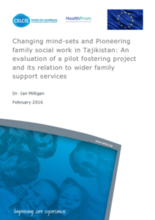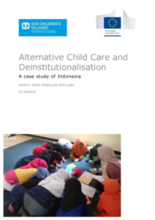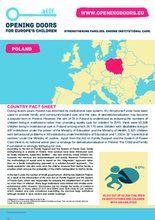Displaying 311 - 320 of 668
This report provides an evaluation of the Keeping and Finding Families Project, a pilot foster care project in Tajikistan.
Este informe presenta información sobre el problema de institucionalización de niños en América Latina y el Caribe.
This video by Child's i Foundation in Uganda document's the journey of a little girl, Praise, from being abandoned to being placed into to a permanent family. The video shows the tracing process and temporary placement with a foster carer, Ruth.
This tool was designed to help those seeking to assist Christian faith-based actors involved in long-term residential care programs make the transition from institutional to non-institutional (family and community-based) child welfare programs.
This report is a case study of alternative child care in Indonesia. Research was conducted that found that with an estimate of 8,000 institutional facilities servicing 500,000 children, Indonesia was overly reliant on institutional care.
This Country Fact Sheet discusses deinstitutionalization as part of Hungary’s child welfare and protection policy.
This fact sheet highlights Austria’s process in transforming institutional care towards community-based and family-based systems.
The purpose of this chapter of The United Nations Convention on the Rights of the Child: Taking Stock after 25 Years and Looking Ahead, is to outline the importance of children’s rights monitoring of (international) institutions such as the ICC and to introduce a measurement matrix for undertaking such monitoring.
Due to poverty and military conflicts in the east, the number of children in institutional care in Ukraine has increased.
This Country Fact Sheet discusses Poland’s recent reforms to its institutional care system.








